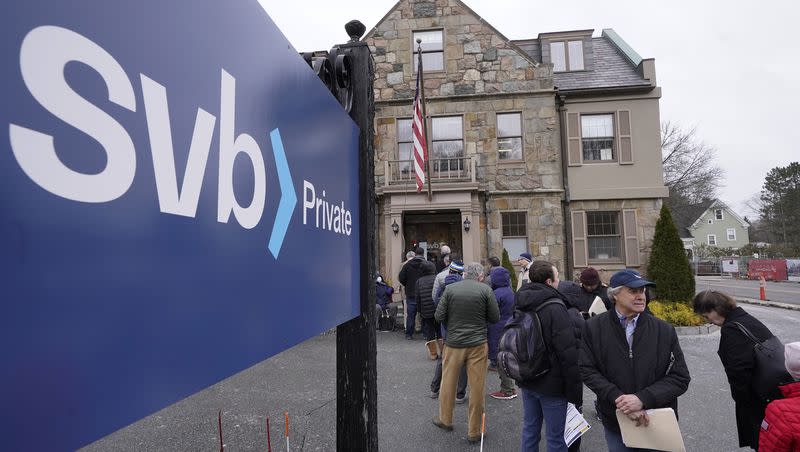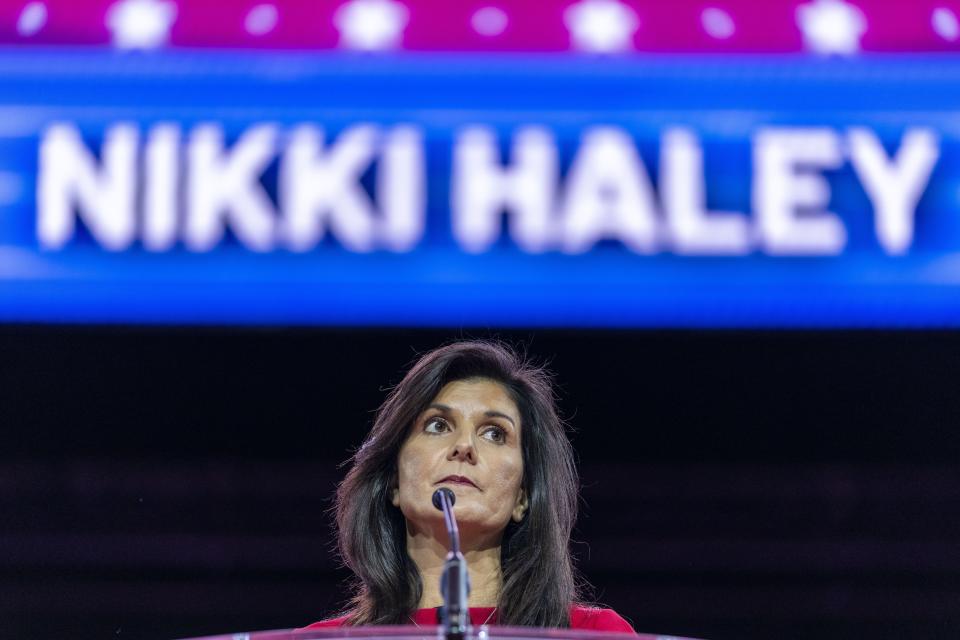Romney and Lee react to Silicon Valley Bank collapse, as Biden announces depositors will be protected

- Oops!Something went wrong.Please try again later.
- Oops!Something went wrong.Please try again later.
President Joe Biden worked to reassure the country about the nation’s banking system on Monday after two banks collapsed over the weekend.
Lawmakers across the country, including Utah’s Republican senators, reacted to the closure of California-based Silicon Valley Bank after the bank was seized by the Federal Deposit Insurance Corp. on Friday.
Following the closure of SVB, Signature Bank was shut down on Sunday, raising concerns among federal regulators who said they would protect all depositors at the two banks, many of whom were in the tech and cryptocurrency sectors.
In remarks Monday morning, Biden said the federal government was taking “immediate” action.
“(A)ll customers who had deposits in these banks can rest assured ... they’ll be protected and they’ll have access to their money as of today,” said Biden. “That includes small businesses across the country that banked there and need to make payroll, pay their bills, and stay open for business.”
He also responded to critics of the government’s actions. He said no taxpayer funds would be used to protector depositors as the money would come from “fees that banks pay into the Deposit Insurance Fund,” and executives running the institutions would be “fired.”
“Because of the actions that our regulators have already taken, every American should feel confident that their deposits will be there if and when they need them,” he said.
He did not take questions from the media after his remarks.
Related
Over the weekend, Sen. Mitt Romney and Sen. Mike Lee weighed in on the bank’s closure.
When the Federal Reserve released its plan Sunday, saying all depositors would be protected, Romney tweeted, “Right decision.” The statement was released jointly by Treasury Secretary Janet Yellen, Federal Reserve Chair Jerome Powell and FDIC Chairman Martin Gruenberg.
“No losses associated with the resolution of Silicon Valley Bank will be borne by the taxpayer,” the statement said.
Right decision. https://t.co/Pgg3zVXGPD
— Mitt Romney (@MittRomney) March 12, 2023
On a call with members of the state’s tech sector Monday morning, Lee said he knew many in the industry would be relieved by the actions of federal regulators.
“I’m glad that those with deposits at these institutions will have access to their cash. That is a good thing. Could have caused all kind of additional issues.” But, he said, “I do look forward to hearing what the plan is by the regulators moving forward to make sure things like this don’t happen in the future.”
On Friday, Lee tweeted about SVB’s actions on diversity, equity and inclusion, and its “ESG score” — referring to the bank’s environmental social and governance score, a measure of whether the bank is taking those issues into consideration in its investments.
“Well, ESG and DEI certainly didn’t save SV(B),” he tweeted.
Well, ESG and DEI certainly didn’t save SVP. https://t.co/aqXjMUgNhB
— Mike Lee (@BasedMikeLee) March 10, 2023
Conservatives have been critical of ESG scores, saying investment decisions should be based on profitability and not a business’ actions on social issues.
In a series of tweets on Sunday, Romney laid out why he supported protections for depositors at SVB, even though many weren’t protected by federal insurance programs.
“Regional & local banks are critical to starting & supporting small businesses of all kinds,” he tweeted. “The federal government must act immediately to assure depositors at SVB and at regional and local banks everywhere that their deposits are completely safe. The immediate and long term consequences of failure to do so could be extreme.”
Related
Other lawmakers and candidates weighed in on federal regulators’ actions.
Virginia Democratic Sen. Mark R. Warner, who is on the Senate banking committee, said in a statement that “very real risks of instability” emerged after “an unprecedented and reckless run on Silicon Valley Bank,” which ultimately put the country’s security and “technology innovation ecosystem at risk.”
But, he said, that the federal agencies “have together acted as Congress intended when we wrote Dodd-Frank by acting swiftly and responsibly to protect depositors and make sure that our financial system remains stable, while at the same time making clear that bank shareholders and bondholders shouldn’t expect any kind of bailout by the taxpayers.”
In an interview on “State of the Union” on CNN Sunday, South Carolina Republican Rep. Nancy Mace also opposed a bailout: “We cannot keep bailing out private companies, because there are no consequences to their actions,” she said.
It appears lawmakers on both sides of the aisle share this view. Earlier on Saturday, Democratic Rep. Ro Khanna of California made a statement similar to his GOP counterparts on Twitter, saying executives and investors should bear the risk, “but this should not mean that workers go without paychecks on Monday or small businesses collapse.”
“I doubt that anyone that has anything to do with Silicon Valley Bank, both here at home and across the country, has really slept a full night without worry,” Rep. Anna Eshoo, a California Democrat whose district falls in Silicon Valley, told Politico. She applauded the FDIC’s action.
Meanwhile, Vivek Ramaswamy, a Republican businessman who announced his bid for president in 2024, tweeted that venture capital firms and start-up executives are creating a narrative “that there’ll be a bank run on Monday if SVB depositors aren’t bailed out by the government.”
There’s something very ugly happening right now: VCs & startup execs who stand to lose their deposits at SVB are going *out of their way* to push a narrative that there’ll be a bank run on Monday if SVB depositors aren’t bailed out by the government. They’re yelling fire in the… https://t.co/6GYfGRczPk
— Vivek Ramaswamy (@VivekGRamaswamy) March 12, 2023
But Ramaswamy said most banks aren’t like SVB, where nearly 89% of deposits were uninsured, and their assets weren’t diversified either, as he explained in an op-ed in The Wall Street Journal.
“Their real ‘hedge’ was to spend $$ to become popular in the right influential circles of their own depositors, pledging $5 billion in 2022 to ‘sustainable finance and carbon neutral operations to support a healthier planet,’” his tweet said.
As for 2024 presidential candidate Nikki Haley, a former U.S. ambassador and former governor of South Carolina, she said that “private investors can purchase the bank and its assets” and that it isn’t “the responsibility of the American taxpayer to step in.”


